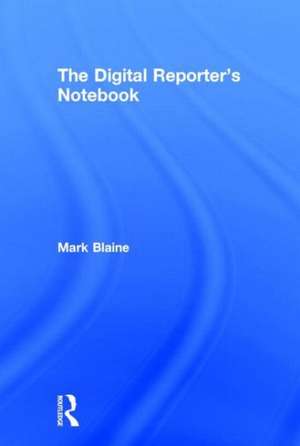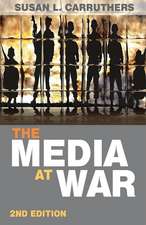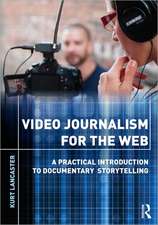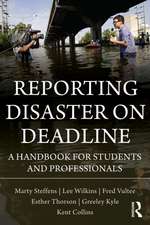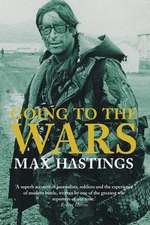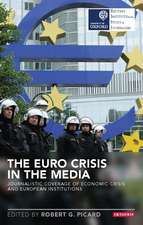The Digital Reporter's Notebook
Autor Mark Blaineen Limba Engleză Hardback – 4 noi 2013
These forty brief chapters provide a versatile toolkit for multimedia journalists, including activities and exercises to build a strong foundation in digital storytelling. Readers will also want to try the interactive app, which includes videos and animations that bring the concepts and ideas in the book to life.
Topics include:
- Lighting & Framing
- Collecting Sound
- Scene Setting & Relevant Detail
- Interview Techniques
- Story Structure
- File Management
| Toate formatele și edițiile | Preț | Express |
|---|---|---|
| Paperback (1) | 345.79 lei 6-8 săpt. | |
| Taylor & Francis – noi 2013 | 345.79 lei 6-8 săpt. | |
| Hardback (1) | 996.33 lei 6-8 săpt. | |
| Taylor & Francis – 4 noi 2013 | 996.33 lei 6-8 săpt. |
Preț: 996.33 lei
Preț vechi: 1215.04 lei
-18% Nou
Puncte Express: 1494
Preț estimativ în valută:
190.64€ • 199.58$ • 157.75£
190.64€ • 199.58$ • 157.75£
Carte tipărită la comandă
Livrare economică 05-19 aprilie
Preluare comenzi: 021 569.72.76
Specificații
ISBN-13: 9780415898607
ISBN-10: 0415898609
Pagini: 136
Ilustrații: 48 halftones, 12 line drawings and Follow Amateurs
Dimensiuni: 152 x 229 x 15 mm
Greutate: 0.34 kg
Ediția:1
Editura: Taylor & Francis
Colecția Routledge
Locul publicării:Oxford, United Kingdom
ISBN-10: 0415898609
Pagini: 136
Ilustrații: 48 halftones, 12 line drawings and Follow Amateurs
Dimensiuni: 152 x 229 x 15 mm
Greutate: 0.34 kg
Ediția:1
Editura: Taylor & Francis
Colecția Routledge
Locul publicării:Oxford, United Kingdom
Public țintă
Postgraduate and UndergraduateCuprins
Acknowledgments. Introduction. 1. The Digital Notebook. 2. Why Do I Care? 3. Thinking Multi-platform. 4. Letting the Story Unfold. 5. Small Story, Big Story. 6. Text Triage: Have Information. 7. Text Triage: Connect Information. 8. Text Triage: Speak the Language. 9. Conventions. 10. Where You Stand: Framing. 11. Where You Stand: Lighting. 12. Where You Stand: Wide, Medium, Close. 13. Collecting Details: Seeing B-Roll and the Stuff of Stories. 14. Collecting Details: Listening for Natural Sound. 15. Talking to Real People. 16. Talking to the Right People. 17. Asking for an Interview. 18. Talking to Multiple People. 19. Preparing Questions. 20. Taking Notes and Recording. 21. Rhythm. 22. Shut Up. 23. Body Language. 24. Location. 25. Quotes. 26. Anecdotes. 27. Relevant Detail. 28. Physical Description. 29. Place Description. 30. Setting a Scene. 31. Action & Sequence. 32. Say It in a Sentence. 33. Complex Information. 34. Numbers & Data. 35. Structure. 36. Storyboard. 37. File Management: Naming. 38. File Management: Folders. 39. File Management: Version Control. 40. One last bit. Glossary. About the Author.
Notă biografică
Mark Blaine teaches multimedia storytelling techniques in the School of Journalism and Communication at the University of Oregon. He has been an investigative reporter, speaker, author, and editor for magazines and newspapers.
Recenzii
"Mark Blaine's got the goods. This concise and insightful book contains golden nuggets that will improve the storytelling game for any journalist—from students just learning how to get out into the field to the citizen blogger wanting to pick up professional skills; even seasoned journalists may find this a refresher course on better storytelling techniques." —Kurt Lancaster, Northern Arizona University, author of Video Journalism for the Web and DSLR Cinema
Descriere
Powerful storytelling engages the senses, and today, there are more accessible digital tools available for telling multimedia stories than ever before. The Digital Reporter’s Notebook teaches practical digital storytelling techniques that journalists can put into practice right away, using the technology they already have in their pockets. Mark Blaine demonstrates how to gather information and organize it into a successful multimedia story without losing sight of the essentials of good journalism.
These forty brief chapters provide a versatile toolkit for multimedia journalists, including activities and exercises to build a strong foundation in digital storytelling. Readers will also want to try the interactive app, which includes videos and animations that bring the concepts and ideas in the book to life.
Topics include:
These forty brief chapters provide a versatile toolkit for multimedia journalists, including activities and exercises to build a strong foundation in digital storytelling. Readers will also want to try the interactive app, which includes videos and animations that bring the concepts and ideas in the book to life.
Topics include:
- Lighting & Framing
- Collecting Sound
- Scene Setting & Relevant Detail
- Interview Techniques
- Story Structure
- File Management
